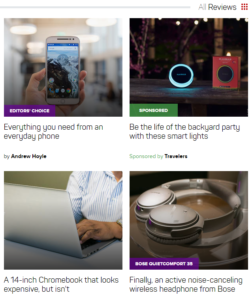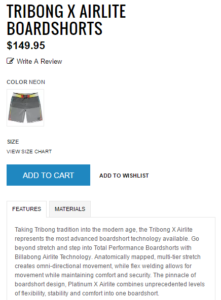I’m super curious about the products or services that were so remarkably good or so exceptionally bad that you’ve gone to the trouble of creating a profile on some website and writing an online review. In a vast ocean of average, meh, good enough stuff, what has stood out enough for you to take action? This matters today when direct recommendations and online reviews are BY FAR the most trusted source of information for consumers making a purchasing decision of ANY kind. New car, new coffee mug – it’s all the same how people decide. For me, the one and only Amazon review I’ve ever written was earlier this year. I was so disappointed in Chris Guillebeau’s latest book, “Born For This,” (click here to not go anywhere near the buy link – you’re welcome) that I signed in just to leave a 2-star Amazon review. And on the flip side, just last week I wrote a review on my friend Vicky’s Etsy shop because it is AMAZING and I love the Pocket Peacemakers she hand-paints. YOU have more power than a TV ad. How have you used your power lately? Continue reading Have you ever written an online review of a product or service?
Category Archives: …Ask About Media Messages
When was the last time that an advertisement really worked on you?
Okay, if I’m being honest, the very last time that an advertisement really worked on me it was 9 days ago when the series of McDonald’s ads that played during NBC’s coverage of the Rio Olympics convinced me to eat some chicken nuggets. I loved nuggets as a kid and boy do I ever still love them now. Crispy fried golden perfection! The ads kept talking about how the new nugget formula (err I mean recipe) was better and more natural and free of artificial preservatives. And the ads hearkened back to childhood and made me remember family road trips and midnight snacks with my dad. I don’t delude myself into thinking that McDonald’s promotes healthy living or, as a company, is an ecological net-positive. But I acknowledge that a handful of my happy childhood memories involve the chain and I WANTED to feel good about eating the “new” nuggets. So I bought them for lunch on a Saturday and you know what? I enjoyed all 14. It’s important to recognize when advertising works on you. And it’s important to reflect on WHY it does when it does. You consume more deliberately this way. Continue reading When was the last time that an advertisement really worked on you? →
If you could replace all the advertising messages in your life with some other message, what would you choose?
You know those plugins for Facebook that will replace all the baby pictures in your newsfeed with pictures of cats? Or replace all the political posts in your feed with high-res images of bacon? I wonder what life would be like if that kind of universal “find-and-replace” were possible with the non-stop advertising we get bombarded with day in and day out. SO MUCH of the messaging we encounter in daily life is engineered to get us to take out our wallets and trade money for stuff. That is the ultimate and only goal. Everything is optimized around it. The intensity of it all is truly staggering.
What if all those messages were optimized for some other outcome? ANY other outcome. Can you even imagine it? What if it was all about, who knows, getting you to feel grateful and say thank you?
In line at the grocery store you’d see a magazine with the cover story, “30 Things You Probably Don’t Appreciate Enough.” You’d turn on the radio hoping for music but it would be thank you letters. Again. None of the stations can seem to go more than four songs before playing several minutes of people reading heartfelt thank you letters… Before your Youtube video plays, you’d have to sit through a totally unrelated 15-second clip about not taking people for granted. You’d drive past a billboard with a 2006 Honda Civic on it. The 15 foot tall words would say: “Your ’06 looks great! Happy 10th birthday to all of the 2006 Hondas out there! Thanks for buying a Honda.” You’d stop at a red light. The length of a passing bus would be covered with an ad of two young attractive models smiling above the words: “We swipe right for grateful types.”
After just 1 week of that kind of immersion, how would your mindset be different? Continue reading If you could replace all the advertising messages in your life with some other message, what would you choose? →
Is this “sponsored content?”
If you’re anything like me, you tend to avoid clicking on the “sponsored content.” In a Google search, the sponsored results are the ones that appear at the top of the page. They look almost like normal search results but they’re really advertisements related to what you searched for. Ads. From companies. In a news or media site, sponsored content are articles/videos that look normal but are also paid for by the companies selling the product featured in the article/video.

[One of these things is not like the others!]
Sponsored content is mostly annoying and not useful. But at least it’s labeled “sponsored” which makes weeding it out for the ad that it is much easier.
If only all marketing messages in life (digital and otherwise) had to be labeled “sponsored”! That would be so fantastic. But it’s sadly not the case. Instead, we have to navigate all arenas of modern life and ask, “How is this sponsored content?” But the more you do it, the more informed a consumer you will become. This is especially useful when applied to things that are pitched as “common knowledge” in your circles.
For example, when an article about weddings insinuates that EVERYONE starts planning their weddings 18 months out, is that really because it CANNOT be done in 12 or 6 or 3 months or was that sponsored content? Is that article trying to help YOU out or trying to help out the wedding industry which knows that people who start planning 18 months from the big day are drastically more likely to outspend their 6-month counterparts?
Or how about this: when your Facebook feed is lined with PSAT prep course sales, is that because organizations want your high school freshman to succeed or is it because the SAT is owned by College Board whose annual revenue tops out just south of a billion dollars?
Ask, ask, ask. “Is this sponsored content?” Continue reading Is this “sponsored content?” →
How would you describe this new feature if you stripped away all the marketing hype jargon?
The surf company Billabong currently sells a pair of swim trunks for $150. No joke. Check it out at this link. But if the link goes dead at some point in the future, I’ve grabbed a screenshot and put it here below.
How the heck can you justify a $150 price tag for something that costs a third of that amount under normal circumstances? Well, you do it by saying things like: “the pinnacle of boardshort design” and “Platinum X Airlite fabric.”
Marketers get paid to make everyday things sound like technological breakthroughs. They get paid for that because what they do often inspires consumers to cough up more cash for certain products. They cast a VERY convincing spell (and not just for surfing apparel, obviously). But the spell is easy enough to break. Just ask, how would I describe this new feature in normal English? Here’s a translation for the $150 swim trunks:
“micro perforations” = “the fabric is kinda bumpy in a way you won’t notice”
“Mirco Repel coats fabric to eliminate saturation” = “Scotchgard”
“Laser cut drain holes” = “a hole in the pocket to let water out”
This works for anything that has been given a thick glossy coat of marketing jargon. Breaking the spell will save you money and make you feel happier about the things you already own. Continue reading How would you describe this new feature if you stripped away all the marketing hype jargon? →
What intangible quality is this ad selling? How would I get that quality without money?
Every single advertisement in every single medium (web, mobile, print, tv, radio…) is always selling two things at once. First, it’s selling the widget (a car, a laptop, a beer, a cosmetic surgery…) but second, and more importantly, it’s selling an intangible quality that you in your humanity want dearly.
Respect: It’s what people feel for people who drive Audi’s.
Creative and relevant: How could you NOT be when you’ve got the Macbook Helium now with zero ports. That’s right. No ports. You’ll never charge your laptop again. Because you can’t. Because we literally removed all the ports.
Beautiful and wanted: If you don’t feel like you’re ever good enough, it’s probably because you’ve never tried Cool Sculpting! (Seriously, though. WTF is cool sculpting? Those guys are on the radio non-stop these days…)
When an ad catches your attention, ask yourself what intangible behind the widget is being sold. Then ask yourself how you would earn that trait, not by buying it (cuz it doesn’t’ work that way), but by making it a part of your character. Respect: In the last 6 months, where could I have done better to keep my word? Creativity: What daily habit should I start to keep me writing consistently? Beauty: What practices will make me more comfortable and confident in my own skin?
Buying more stuff can make you a consumer. That is all that it can make you. Continue reading What intangible quality is this ad selling? How would I get that quality without money? →

